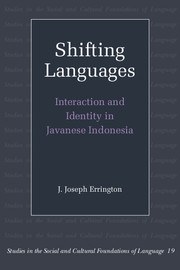Book contents
- Frontmatter
- Contents
- List of figures, maps, and tables
- Acknowledgements
- Preface: suggestions for use
- Note on orthography and transcription
- Map 1 The Indonesian archipelago
- Map 2 Eastern Central Java
- 1 Introduction
- 2 A city, two hamlets, and the state
- 3 Speech styles, hierarchy, and community
- 4 National development, national language
- 5 Public language and authority
- 6 Interactional and referential identities
- 7 Language contact and language salad
- 8 Speech modeling
- 9 Shifting styles and modeling thought
- 10 Javanese–Indonesian code switching
- 11 Shifting perspectives
- Notes
- Works cited
- Index of javanese and indonesian words
- General index
- Titles in the series
11 - Shifting perspectives
Published online by Cambridge University Press: 01 June 2011
- Frontmatter
- Contents
- List of figures, maps, and tables
- Acknowledgements
- Preface: suggestions for use
- Note on orthography and transcription
- Map 1 The Indonesian archipelago
- Map 2 Eastern Central Java
- 1 Introduction
- 2 A city, two hamlets, and the state
- 3 Speech styles, hierarchy, and community
- 4 National development, national language
- 5 Public language and authority
- 6 Interactional and referential identities
- 7 Language contact and language salad
- 8 Speech modeling
- 9 Shifting styles and modeling thought
- 10 Javanese–Indonesian code switching
- 11 Shifting perspectives
- Notes
- Works cited
- Index of javanese and indonesian words
- General index
- Titles in the series
Summary
Even as Indonesia suffers in the throes of unforeseen economic collapse in 1998, its long-term program of national development deserves attention from anyone seeking to understand the survival of development's “imaginary” into the “post-development era” (Escobar 1992, 1995). From almost any angle of vision pembangunan offers a paradoxical appearance. Agents and beneficiaries of the New Order support it assiduously, yet worry about its pernicious side effects; domestic critics read it as thin pretext for coercive state action, but must also acknowledge its real salience for “ordinary” Indonesians' visions of the future and their efforts to make sense of social change in everyday life.
Foreign critics must also recognize this conflicted imaginary's pivotal place on shifting Indonesian landscapes, and in numerous local engagements with far-reaching, translocal change. Outsiders may be quicker to read self-interest into the development rhetoric deployed by a paternalistic, often corrupt state. But if they deny authenticity to any version of development, they can only accord most “ordinary” Indonesians the status of dupes, victims of false consciousness. To insist on the derivativeness of Indonesian development's and nationalism's discourse (Chatterjee 1985) is to deny Indonesian-ness authenticity as a ground for criticizing the state in the name of the nation.
- Type
- Chapter
- Information
- Shifting Languages , pp. 184 - 194Publisher: Cambridge University PressPrint publication year: 1998



